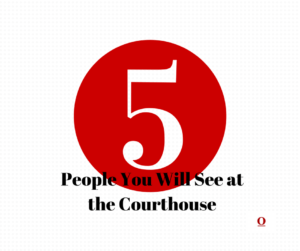
Your first court appearance may make you nervous or anxious. This may be your first time in a courthouse or appearing in court and that is understandable. Your perception of appearing in court will likely be through television and movies and it will probably not be exactly how your day goes. In Denton County, the courthouse can be filled will many types of people and a real cross section of Denton County on any given day or time. And, there are alot of people in the Courts building that are important and necessary for the court system to operate as smoothly and well as it does. These are the people you will encounter as you work through your divorce or family law case. If you are there for a court appearance, here are a few of the people you will see at the Courthouse:
-
Security
When you arrive at the courthouse or courts building, you will go through a metal detector and your briefcase, purse, bags or boxes will go through the x-ray machine before you can go into the building and go upstairs, to the Law Library or into the courtroom where you are scheduled for your hearing.
-
Bailiff
The bailiff is the man or woman in the courtroom who is uniformed law enforcement, sitting near the counsel tables. The bailiff remains in the courtroom throughout the proceedings of the day.
-
The Court Reporter
The court reporter usually sits on one side of the judge or the other or sometimes sit in the front of the judge and the bench and is the one making a record of the testimony, and admitting the exhibits that your lawyer has prepared during the hearing or trial.
-
Opposing Counsel
You will probably see opposing counsel in the hall before your hearing or trial. He or she may speak with your lawyer and possibly may address you or introduce themselves to you. The opposing attorney will probably not try to talk with you without your lawyer though.
-
The Judge
The Judge will enter the courtroom from the front, near the area that she or he will sit, which is called the bench. The Judge will wear a black robe, like you would imagine a judge would wear. Remember to stand when the judge enters or leaves, listen when the judge speaks and speak directly to the judge only if the judge speaks directly to you and be respectful.
These are just a few pieces of information that I use to prepare my clients for hearings and trials. Full hearing and trial preparation should be done with a family law attorney.
Jill O’Connell, 940-497-5454

